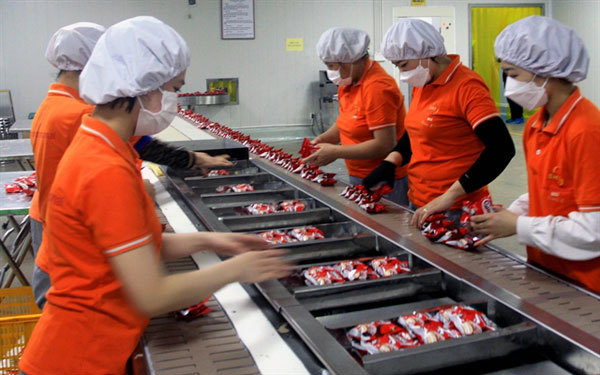 |
|
Workers at a confectionery line at Bao Hung International JSC in Thai Binh Province. Several factory workers agree with the overtime increases as they could earn more to make ends meet.
|
The cap for annual overtime has also been increased from 200 hours to 300 hours, according to Decree 17 signed and issued by National Assembly chair Vuong Dinh Hue on Saturday.
The decree will take effect from April 1.
It follows a proposal made by the Ministry of Labour, Invalids and Social Affairs on March 10 to increase the monthly overtime cap, as businesses were reported to be struggling to keep production going since their employees got infected with COVID-19 and had to take time off work.
Employers must have their workers’ consent to implement overtime, the decree states. They should provide benefits to ensure workers have more incentives to work than regulated in the labour laws.
Those not eligible to work more overtime are workers under 18 years old, workers with disabilities, those whose nature of the job is dangerous and toxic, pregnant women at six or seven months or more (depending on their locations), and mothers raising children under one year old.
The Government and labour ministry will oversee the implementation of the decree. The General Confederation of Labour is tasked with guiding all-level labour federations to monitor the implementation to ensure workers’ rights.
Reports by Tuổi trẻ (Youth) newspaper show several workers are happy with the increases.
Pham Thi Hau, a textile worker in HCM City’s District 12, said: “My job has been disrupted by the pandemic for the entire year, now I want to work to earn money. Prices keep increasing, my rent included, I wouldn’t be able to keep up without working overtime. My colleagues and I heard these changes are just temporary, so we all agree.”
Y Ngoan, a textile worker in HCM City’s Binh Chanh District, said she earned an extra VND3-4 million (US$131-175) a month for overtime work. “As the pandemic is easing off, everyone wants to work overtime to earn more. All prices are increasing so we have to work more to make ends meet.”
However, despite workers’ approval, business and labour associations said overtime increases should just be a temporary solution.
Nguyen Van Be, chairman of the HCM City Export Processing Zone and Industrial Park Authority Business Association (HBA), said labour shortages are the real difficulty enterprises are facing. This was due to workers getting infected with COVID-19 and challenges in recruiting new ones.
“There are no official statistics, but some enterprises that had more than 1,000 workers before the pandemic now only have about 500. So temporary solutions to keep the production going are essential,” he said.
But in the long run, businesses need to recruit more workers and invest in their facilities to make up for the lost productivity, he added.
Nguyen Thanh Do, head of HCM City Labour Confederation’s policy and law department, said that since prolonged overtime will affect workers’ health, there should be policies that require employers to provide meals and food supplements at reasonable prices to help them recover.
“Increasing overtime of current employees means businesses don’t have to recruit new workers, which also means they could pay less for workers’ social insurance and allowances. So we need to calculate what overtime rate would be the most beneficial to workers. Working overtime at the expense of their health but getting paid the same will be bad for them,” he said.
Source: Vietnam News

Overtime capped at 60 hours per month
The National Assembly (NA) Standing Committee on March 23 adopted a resolution on overtime hours of employees in a month and in a year.

New overtime plans facing scrutiny
While waiting for approval from the National Assembly Standing Committee, proposals by the Ministry of Labour, to extend overtime limits are being looked at closely by business associations and trade union representatives.